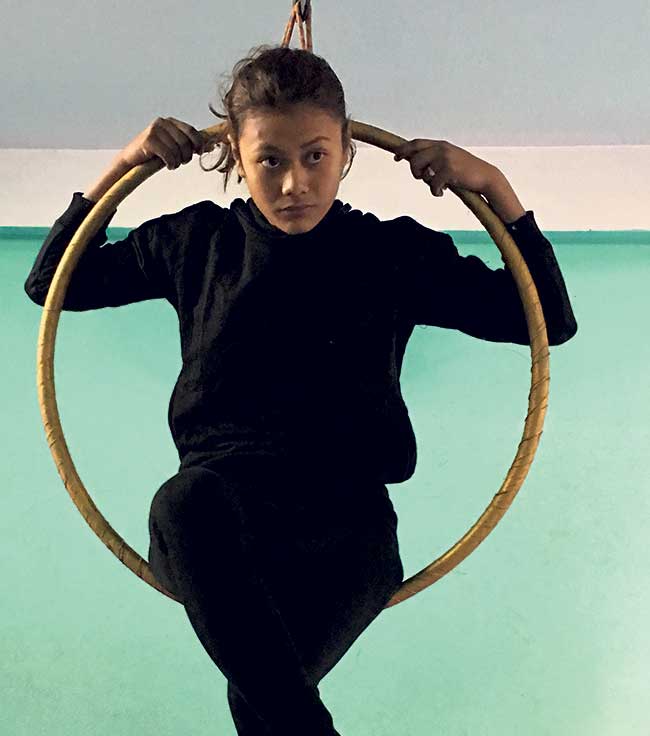“I want to be a professional aerial dancer in the future.”
Situ Maharjan is just 16 years old but she is well on her way of becoming a professional aerial dancer. She started her journey as a student at a dancing institute as she simply loved to dance. It was her instructor who introduced her to the aerial dance form. Since then, she says that aerial dance has been her favorite dance form and she has been practicing it for almost four years now.

What she loves most about aerial acts is the hanging bit. She likes moving with the music and enjoys performing tricks with ropes and rings. “There is nothing to fear while doing aerial acts for we have soft mattresses beneath us while practicing and emergency kits in case of any injury. So, even if you fall, there is hardly any chance of getting severely hurt. And after practicing for 100 times, we have no fear left when it’s time to perform on the main stage,” she shares further adding that the audiences and their cheers make her more confident and encourage her to do her best.
Maharjan’s parents are very supportive of her decision of being a professional aerial dancer. They are focused on providing any training possible to help her live her dream in the future. Maharjan also tries her best to make her parents happy so she makes it a point to balance schoolwork and practice sessions. However, she manages to squeeze in four hours of dance practice every day.
 “I understand that building a career in dance is not easy. You need to know many dance forms and be able to perform to any type of music. For this, one requires a lot of practice. So for now, let’s say, I’m just preparing for my career,” she concludes.
“I understand that building a career in dance is not easy. You need to know many dance forms and be able to perform to any type of music. For this, one requires a lot of practice. So for now, let’s say, I’m just preparing for my career,” she concludes.
“Dancing is fun but choreographing has its own charm.”

Dancing on his toes

Rohiyaa Maharjan’s journey of dance started pretty much as soon as she started walking. She still vividly remembers copying steps she saw on television and performing it on her own. When she grew up, she started exploring more genres of dance. Every time she saw a new form, she wanted to learn and master it. Today, after practicing dance as a career for years, she is confident and considers herself capable of teaching any dance form including aerial dance.
It has already been six years since she started learning aerial dance. Though the concept was new back then, her curiosity and passion for dance were what made her take it up. “When I first began, the concept of aerial dance was very new in Nepal. It looked amazing but not many people were interested in taking the risk of hanging over 10 feet or more in the air. Yet, I really wanted to learn and share the techniques with other,” she recalls. For the next six months, she took various classes and even sought help from online videos to master different tricks of aerial dancing.
After six months of intense training and practice, she was all set to teach the dance form to those who were interested. However, since the dance form was risky, she had to double-check every step before teaching it to her enthusiastic students. She choreographed her first aerial act for a festival organized by Nepa Dance Academy and the participants were all below 16 years old.
“I wouldn’t have been as scared as I was that day if I had been performing. But since I was working with young people, I was sick with worry,” she says adding that even though she had made her students practice the acts for six months before the actual performance, it did nothing to put her at ease. “Yes, practice does help but on stage anything could go wrong,” she says.
Maharjan points out that body flexibility, tight core and strong upper body strength are essential to be able to perform aerial acts. But more importantly, one should be passionate about dance as well as have confidence. But that’s not all either. You have to be willing to practice for long hours, for months and even years. Only when dancers are able to adopt that strict lifestyle can they truly learn aerial acts.
 Maharjan’s latest stint as a choreographer was for the dance reality show Boogie Woogie Nepal. She was one of the three choreographers of the show. She has also been choreographing Miss Newa after winning the title of Miss Talent in 2005. Maharjan considers herself lucky to have been able to work with many televisions celebrities of Nepal and for everything good that’s come her way she credits dance.
Maharjan’s latest stint as a choreographer was for the dance reality show Boogie Woogie Nepal. She was one of the three choreographers of the show. She has also been choreographing Miss Newa after winning the title of Miss Talent in 2005. Maharjan considers herself lucky to have been able to work with many televisions celebrities of Nepal and for everything good that’s come her way she credits dance.
“I have come a long way, from a mere trainee to president of Circus Kathmandu.”
 Bijay Limbu is best known for his aerial strap acts. It’s a type of dance where you perform with the support of ribbon-like material in the air. He says it is one of the hardest aerial dance forms as it requires more practice, strength, and flexibility compared to the other forms. However, it was this difficulty level that made him want to learn it. Today, Limbu also conducts acrobatic classes for people of all ages.
Bijay Limbu is best known for his aerial strap acts. It’s a type of dance where you perform with the support of ribbon-like material in the air. He says it is one of the hardest aerial dance forms as it requires more practice, strength, and flexibility compared to the other forms. However, it was this difficulty level that made him want to learn it. Today, Limbu also conducts acrobatic classes for people of all ages.
Initially, he was a national level gymnast who wanted to bring medals home. But, no matter how good the players were, he mentions there was no scope for athletes to sustain their lives in Nepal back then. Due to this, he was in a dilemma. He didn’t know if he wanted to continue gymnastics or not. He was interest in b-boying but that was not a career option either.
Then one day he saw an aerial act where performers were using the same tricks as those in gymnastics. But the only difference was that they were hanging from rings, straps or silk ropes. From their costume to the dance moves, it was all fascinating enough to convince him to consider aerial dancing as a career. Soon afterwards, he joined Circus Kathmandu to learn the skills. Even though he was already a gymnast and had a flexible body, he recalls that it was not an easy task to learn the aerial dance form.
“I was really excited to learn aerial dance. But the training on the first day took all my excitement away. Hanging 15 feet above the ground was not as easy as it looked,” he shares. But his passion and interest for the act encouraged him to not give up and keep practicing.
To make matters worse, Limbu was also criticized for joining a circus company. The concept of contemporary circus was just newly introduced in Nepal back then. Many people including his family members weren’t happy with his decision and suggested he quit. But that too could not deter the dedicated lad. And, after a year of hard work, exercises and training, finally in 2010, Limbu became a professional aerial dancer.
So far, Limbu has performed in various national and international shows. Currently he not just dances but also choreographs and coordinates the team of Circus Kathmandu as its president. He considers establishing a circus and changing people’s mindset about it his biggest achievements till date.






































